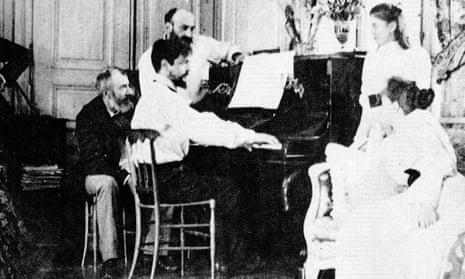The famous French composer Claude Achille Debussy, who had been suffering from cancer, has died in Paris at the age of 55. Debussy is not only the most original but the most refined and, since Berlioz, the first truly modern composer of the French school.
His first works gave merely the sense of an exquisite refinement and freshness, and when in 1884 he won the Rome prize with his scenic cantata L’Enfant Prodigue there was little to proclaim the most revolutionary of modern French harmonists. In the setting of Rossetti’s poem The Blessed Damozel, for female voices and orchestra, he found a subject and a medium of expression as exquisite as even his imagination could desire. His fastidiousness now turned itself to the invention of harmonic subtleties, in as judicious concessions to poetic ideas and the sense of the picturesque as can be reflected in music. Debussy’s genius in this harmonic development has not only been vindicated by the admiration of his own works but by the adhesion of a host of followers, whose work has made the French school the most significant of our day.
With his orchestral prelude on Mallarmé’s Après-midi d’un Faune, Debussy has convinced the general ear of a sensuous colour and atmosphere in orchestral music of which it had not been merely unconscious but sceptical and even derisive. The subdued tones of Maeterlinck’s drama Pelléas et Mélisande provided him an ideal medium for a triumph which stands alone to point the true way in the future development of dramatic music.
Debussy is one of the leaders in the true assimilation of song and speech, and in the relation of lyric melody to the instrumental, harmonic and poetic fancy. He is also one of the few who know the true refinement and poetic nature of the pianoforte.
Of all composers in our day Debussy has the finest aesthetic. He has left us a world of beautiful music, and his influence is the most fertile since that of Wagner.
This edited extract from the obituary that appeared in the Guardian on 27 March 1918, two days after Debussy’s death.
This article was amended on 22 March 2018 to correct a sub-heading which may have suggested that the obituary had appeared on 19 March 1918

Comments (…)
Sign in or create your Guardian account to join the discussion